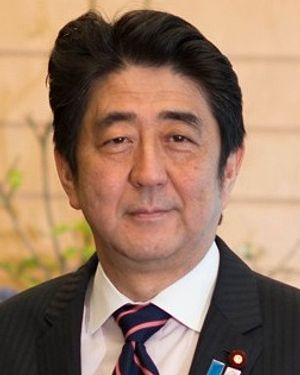A Japanese government spokesperson confirmed Wednesday that Japanese Prime Minister Shinzo Abe sent a note to a ceremony where over a thousand World War II-era war criminals were being honored. Chief Cabinet Secretary Yoshihide Suga noted that although Abe did send the note, he did so in his capacity as the head of the ruling Liberal Democratic Party and not as the prime minister of Japan. The message in question was delivered to a ceremony on April 29 at the Koyasan Buddhist temple. According to the organizers, Abe is the first prime minister to send a note to the ceremony during his time in office.
According to the Associated Press, which saw the note, Abe wrote the following: “I humbly express my deepest sympathy for the martyrs … who sacrificed their souls to become the foundation of peace and prosperity in Japan today.” The prime minister added: “I hope for eternal peace and pledge to work toward a harmonious coexistence of mankind in the future.”
This news is likely to draw a backlash from Japan’s neighbors who suffered at the hands of Japanese militarism in the 20th century. In particular, Chinese and Korean leaders have regularly condemned Tokyo for not adequately apologizing for past Japanese militarism. Shinzo Abe has become a lightning rod for criticism as he is a particularly committed Japanese nationalist. In December 2013, Abe visited the controversial Yasukuni Shrine, sparking widespread condemnation from Japan’s neighbors. 14 Class-A war criminals found guilty by the International Military Tribunal for the Far East following World War II are commemorated at Yasukuni. For China and South Korea, Abe’s views on Japan’s history are nothing short of dangerous revisionism.
The Chinese and South Korean governments have yet to react to the revelation. Xinhua, China’s state-run news agency, published a report on the incident although it did not condemn Abe or Japan. Recently, South Korea’s foreign ministry condemned an offering made by the Abe government to the Yasukuni Shrine on the 69th anniversary of Japan’s surrender at the end of World War II. “Ties between South Korea and Japan cannot be improved thoroughly until Japanese politicians give up their historical revisionism and apologizing [sic] for the country’s wartime crime,” noted Noh Kwang-il, a spokesperson for the South Korean foreign ministry, in a statement.
Memories of Japanese militarism remain highly salient in the international relations of Northeast Asia. As long as Shinzo Abe remains the prime minister of Japan, they will likely continue to remain important.

































